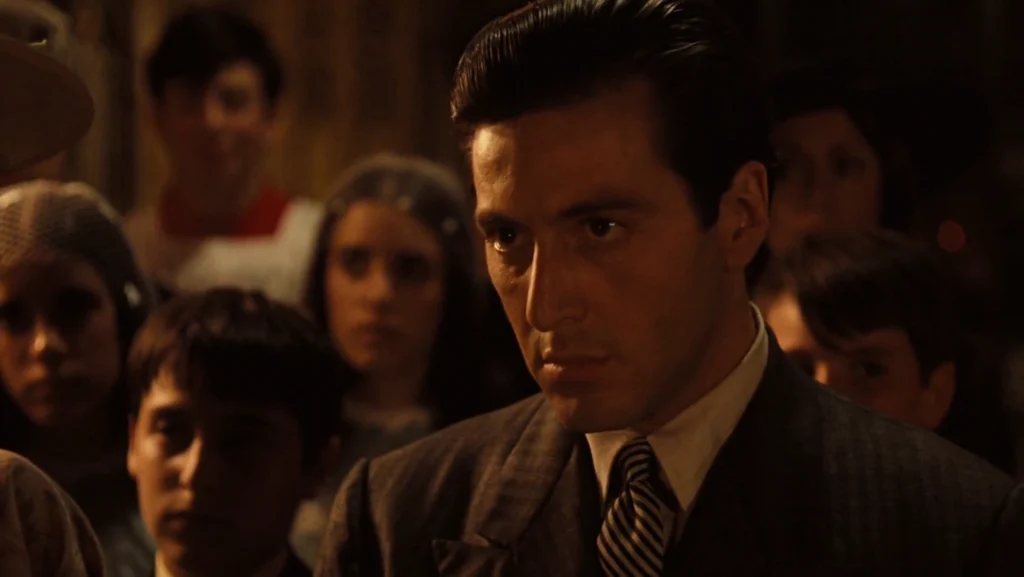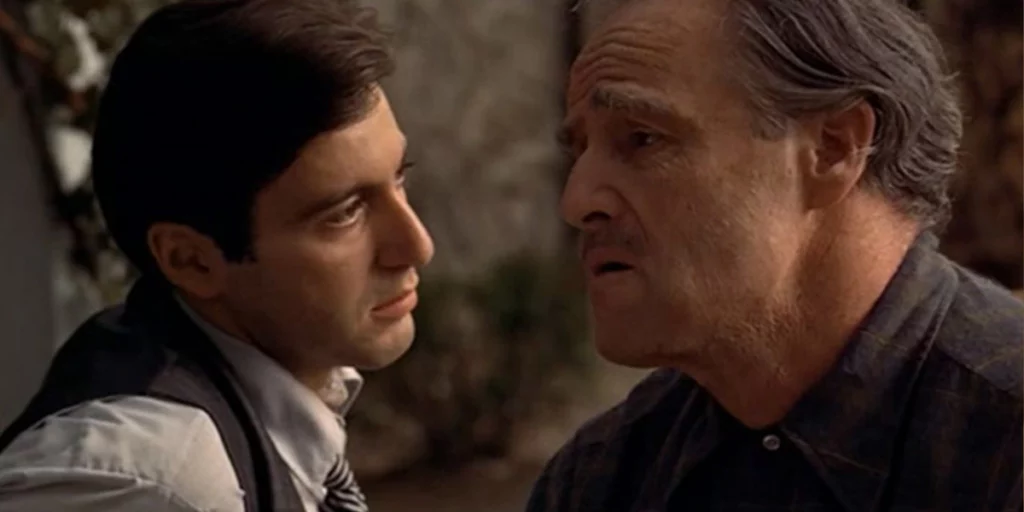Time repeats itself time and time again, and the prolific crime epic The Godfather explores just how dangerous and self-destructive the idea of ‘legacy’ can be.
This article contains spoilers for ‘The Godfather’ Parts 1 & 2.
“I’m going to make him an offer he can’t refuse”
It’s become one of the most famous and quotable lines in all of cinema history, but the context behind Vito’s (and later Michael’s) words in Coppola’s The Godfather is much more sinister and thematic than they could ever seem in isolation. They’re spoken by Don Vito Corleone (Marlon Brando) very early on in the film, when asked by a friend of the family how he expects to get his enemies to cooperate with him. But Vito’s ‘offer’ isn’t really an offer at all. It’s a choice between cooperation and death – either do as the Corleones ask, or risk a very painful and very public execution. But nobody dares refuse the Don’s offer, because the Corleones have a complete monopoly over the streets of New York City. Cooperation with the family’s regime is inevitable, and resistance is futile – even to the family themselves.
For those unfamiliar with the narrative of Mario Puzo’s original novel (and later Coppola’s three films), the story centers around mafia boss Michael Corleone’s (Al Pacino) rise to power after succeeding his father as the head of the family. The trilogy explores the unbearable weight that is placed upon Michael’s shoulders as he attempts to uphold his father’s legacy whilst maintaining his own personal life and marriage – all whilst a silent war rages throughout New York City between the other powerful families that oppose him. But whilst the protection of his family legacy is Michael’s primary motivation, The Godfather also examines how this twisted ideal of family ultimately becomes the Corleones’ fatal flaw.
One of the first things that Coppola makes clear to the audience at the beginning of The Godfather is that Michael Corleone is different from his brothers. Whilst Vito’s other children strive to be a part of the family business, that has never been Michael’s goal. He doesn’t find any comfort in the workings of the mafia, despite sharing his father’s views about the importance of family. “That’s my family, not me,” he says to his partner Kay (Diane Keaton) in the opening scene of the film. And yet by the end of the film, Michael finds himself as the head of the family in his father’s wake. The prodigal son, the morally conflicted young man with no ambitions of scourging his soul for money and power, sees himself responsible for the murder of every other crime boss in New York City.

So what’s to blame for Michael’s transition into an irrevocable life of crime? Can we really hold Michael accountable, when his entry into the family wasn’t even of his own accord? Or was it Vito’s irrefutable offers that made an ascension into the family business so necessary?
From their very births, the Corleone children had been indoctrinated with the idea that family comes before anything else. Before their friends, before the law, even before themselves. Vito’s respect and admiration of his family is the very reason that the Corleone family business even still operates – not just to provide for them, but to protect them from any outside forces that may still hold vendettas. And it’s this very pressure to protect the family legacy that saw Michael strive so relentlessly to protect his father’s business. With his father and his brother dead, relinquishing his enforced control of the family would have almost certainly led to attacks from the other families in New York. His late father’s words are what pushed Michael to do the unthinkable: “A man who doesn’t spend time with his family can never be a real man.”
At least in this respect, The Godfather presents legacy and destiny to be one and the same: a sort of cosmic force that cannot be escaped, no matter how hard you try. No amount of protest or denial would have kept Michael from being appointed as his father’s successor, and no amount of evasion would ever have allowed him to escape his destiny as the next Don of the Corleone family. The film presents organized crime as a kind of inescapable cycle, with each mafia family forcing the others into their own self-perpetuating, inter-generational rotations. Maybe it was Michael’s very hesitance to enter the world of organized crime that made him such a suitable candidate for the role – he never wanted power or money, only stability for his loved ones. Just like his father.
However, by the end of The Godfather Part 2, it becomes clear that Michael has abandoned all sense of integrity and has become completely overwhelmed by the pressure that running the family has placed upon him. Whilst Vito saw his role as The Godfather as a means by which to protect his family and deter any harm from them, Michael becomes obsessed with his newfound power and attempts to fly too close to the sun. His conquests in expanding the family cause pain and suffering to those around him, and by doing so he breaks the legacy that his father tried so hard to uphold.
He finally destroys all integrity of his father’s heritage at the end of Part 2, when he murders his brother Fredo (John Cazale) for betraying him. Through this pivotal moment in Michael’s journey, we can see that perhaps this focus on legacy is the reason that the Corleone family business is beginning to fall. The virtues placed upon Vito by his father, and consequently upon Michael by Vito, are becoming too much to bear – and the foundations of the business are crumbling under hundreds of years of generational pressure.
Ultimately, it’s the Corleones’ focus on legacy and reputation that causes their empire to crumble so ungracefully. If Michael had been spared by the imperceptible hands of fate and destiny, perhaps he would have been able to live a somewhat normal life where relationships with his children and with Kay could have been healthily maintained. But it was his father’s insistence on ‘family’ that forced him into a position from which he was unable to escape, and from which he became irreversibly tempted by unyielding power and strength. Vito put so much pressure upon his children to uphold an impossibly pristine reputation that he indirectly caused the downfall of his own empire. By leading Michael towards the very same path that he himself once walked, Vito made his son an impossible offer – and Michael was tragically unable to refuse.
The Godfather was re-released in 4K Ultra HD and Digital on March 22, 2022.

